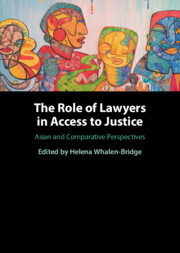Book contents
- The Role of Lawyers in Access to Justice
- The Role of Lawyers in Access to Justice
- Copyright page
- Dedication
- Epigraph
- Contents
- Figures
- Tables
- Appendices
- Contributors
- Foreword
- Acknowledgements
- Abbreviations
- 1 Understanding and Comparing Access to Justice
- Part I Access to Justice in Asia
- Part II Comparative Perspectives on Access to Justice
- 13 Access to Justice and an Islamic Ethic of Justice
- 14 Lawyering in Indonesia’s Religious Courts: Legal Aid, Procedural Justice, and Pragmatism
- 15 Access to Justice and Legal Aid in the Syariah Courts in Malaysia: A Colourful but Threadbare Patchwork System
- 16 The Syariah Court of Singapore: Achieving a More Formal Access to Justice
- 17 Access to Justice in Israel: Rights, Legal Aid, and Pro Bono in a Lawyer Dominant Environment
- 18 Vuk’uzenzele – Arise and Act: Lawyers and Access to Justice in South Africa
- Index
13 - Access to Justice and an Islamic Ethic of Justice
from Part II - Comparative Perspectives on Access to Justice
Published online by Cambridge University Press: 29 September 2022
- The Role of Lawyers in Access to Justice
- The Role of Lawyers in Access to Justice
- Copyright page
- Dedication
- Epigraph
- Contents
- Figures
- Tables
- Appendices
- Contributors
- Foreword
- Acknowledgements
- Abbreviations
- 1 Understanding and Comparing Access to Justice
- Part I Access to Justice in Asia
- Part II Comparative Perspectives on Access to Justice
- 13 Access to Justice and an Islamic Ethic of Justice
- 14 Lawyering in Indonesia’s Religious Courts: Legal Aid, Procedural Justice, and Pragmatism
- 15 Access to Justice and Legal Aid in the Syariah Courts in Malaysia: A Colourful but Threadbare Patchwork System
- 16 The Syariah Court of Singapore: Achieving a More Formal Access to Justice
- 17 Access to Justice in Israel: Rights, Legal Aid, and Pro Bono in a Lawyer Dominant Environment
- 18 Vuk’uzenzele – Arise and Act: Lawyers and Access to Justice in South Africa
- Index
Summary
The theme of justice is central in Islam. Among the 99 ‘beautiful names’ (asma al-husna) of God is ‘al-Adl’ – the Just or Fair. The Qur’an is replete with references to the ideals and pursuit of justice, and justice was also linked with the actions and outlook of the Prophet Muhammad. This chapter elaborates on the importance of the theme of justice in different sources of Islamic normativity. It proposes that in contemporary times the salience of the ideal of justice must also be linked to access to justice. The idea of access to justice, particularly in its contemporary register, was not part of previous Islamic understandings. However, since it was important to realize justice among people and in the world, this chapter argues that access to justice, understood as the capacity for individuals or groups to reach justice-providing venues, is implicit in the Islamic emphasis on justice and may be seen as one part of an Islamic ethic of justice. The emphasis on the ideal of justice (or of acting justly), as a reflection of the justice of the divine, also suggests another facet of an Islamic ethic of justice, namely a concern with substantive fairness.
- Type
- Chapter
- Information
- The Role of Lawyers in Access to JusticeAsian and Comparative Perspectives, pp. 247 - 259Publisher: Cambridge University PressPrint publication year: 2022



